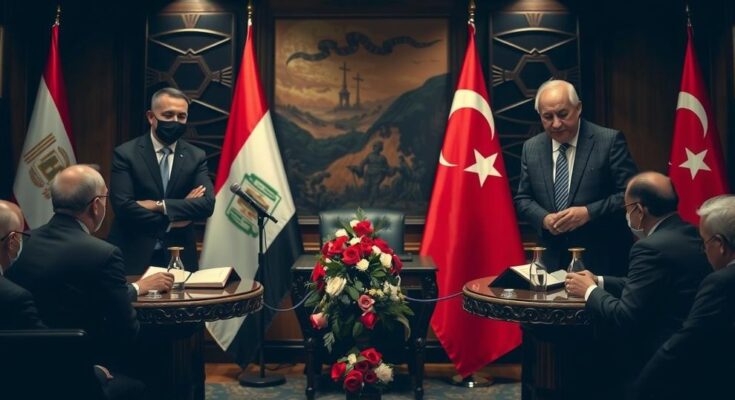The recent closer ties between Egypt and Turkey may provide a foundation for reducing tensions in Libya, where both nations have historically supported opposing factions. Amid economic crises, their collaboration seeks to foster security and political stability, although underlying issues persist. Prominent analysts emphasize the need for ongoing dialogue and actionable results as these nations navigate their relationship in a complex regional landscape.
The recent warming of relations between Egypt and Turkey may pave the way for a reduction in tensions among Libya’s rival factions. Both countries have historically supported opposing sides in the Libyan conflict, but the current developments suggest a potential shift towards collaboration. In light of a temporary halt in Libyan oil exports due to disputes over its central bank’s control, the resumption of these exports indicates a fragile resolution still plagued by underlying issues, as noted by Jalel Harchaoui of the Royal United Services Institute. The dynamics between Egypt and Turkey have undergone a transformation, with both now expressing a commitment to consult on measures aimed at achieving security and political stability in Libya. Egyptian President Abdel Fattah al-Sisi emphasized this goal during a press conference with Turkish President Recep Tayyip Erdogan in Ankara. Previously, Cairo supported the eastern Libyan administration led by Khalifa Haftar, while Ankara backed the western Government of National Unity in Tripoli. This recent collaboration is considered crucial for addressing the challenges currently facing Libya. Murat Aslan, affiliated with the SETA Foundation for Political, Economic and Social Research, remarked, “Both countries can push the Tripoli-based government at least to accept something or come to the least terms that they can agree. So it’s a win-win situation for both Egypt and Turkey.” Moreover, the economic crises afflicting both nations are propelling their rapprochement, as cooperation in Libya presents significant economic opportunities. Aya Burweila, a Libyan security analyst, highlighted the strategic division of influence that both countries have now established, leading to lucrative infrastructure agreements, especially in eastern Libya. Ankara is depending on Cairo to leverage its influence to support agreements with the Tripoli government regarding energy exploration in Libyan waters. In contrast, Cairo seeks to remove the Turkish-backed Prime Minister Abdul Hamid Dbeibeh from power. Nonetheless, Harchaoui asserts that both nations remain committed to ongoing dialogue and cooperation. He stated, “What has already been decided is that they are going to speak and they are going to speak on a daily basis. And then at every crucial moment, they are going to make sure and Turkey, specifically, is going to make sure that Egypt is on board. But we need more tangible results from the dialogue that has already been in place.”
The situation in Libya has been characterized by a protracted civil conflict involving various factions and a power struggle between rival administrations. Egypt has historically supported the eastern administration led by Khalifa Haftar, while Turkey has backed the Tripoli-based Government of National Unity. The reinforcement of relations between these two countries signals a possible change in the landscape of Libyan politics, with the potential for collaborative efforts to foster stability and peace. The resumption of oil exports amidst economic turmoil highlights the challenges that Libya faces and underscores the importance of international partnerships.
The burgeoning relationship between Egypt and Turkey symbolizes a hopeful shift towards stability in Libya, where both nations are seeking to navigate their historical rivalries in favor of cooperation. The combination of economic imperatives and strategic dialogue positions them as key actors in the pursuit of peace and political stability within Libya. However, the successful implementation of their collaborative efforts will require continued dialogue and tangible outcomes.
Original Source: www.rfi.fr




